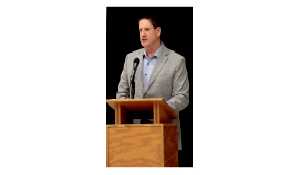Provincial policy in place against cellphones in classrooms
August 13, 2024, 3:13 pm
Ashley Bochek


The province has announced a policy for this upcoming school year, with cellphones being banned in Kindergarten to Grade 12 classrooms.
Jeremy Cockrill, Saskatchewan’s Minister of Education, says the purpose of the ban is to allow students to focus on their education with no distractions.
We interviewed Cockrill Wednesday and the full interview follows:
Can you explain the new policy for cellphones in the classroom?
The overall policy is we want to make our classrooms the best learning environment possible, free of distractions. Starting this school year we’re working with all 27 school divisions to make sure that during class time for kindergarten to grade 12 there are no personal cellphones allowed in Saskatchewan classrooms.
There are two caveats to that, number one, we are going to be working with school divisions and families to establish medical exemptions. For example, if someone is living with diabetes and has a continuous blood glucose monitor they’re going to need their cellphone with them because that is an important tool for them to manage their health. That is an exemption to the policy. Also, there is an exemption for grades 9-to-12 if the teacher can present an intentional instructional purpose for having a cellphone in the classroom they can get approval from their principal. Then cellphones will be allowed in the classroom, but only if they can present that intentional instructional purpose and their principal approves. Other than that, we don’t want to see any cellphones in classrooms across Saskatchewan.
What were some of the deciding factors for putting this policy in place?
We’re not the first province to do this. If you look across the country we’re probably the ninth province to move in the direction of restricting cellphone usage in classrooms. This is a discussion that is happening on a national level and so our decision to go ahead with this policy brings it home to Saskatchewan.
I am hearing from teachers, EAs, and other school staff that managing cellphone usage has become quite a challenge in the current school environment. Cellphones have proliferated in a big way in our society and people younger and younger are getting cellphones. I think I had my first cellphone in grade 9, but I am hearing students much younger than that who are having cellphones and bringing them to school. The reality is there are more cellphones around and they’re causing a distraction, and not to mention we understand the mental health impact that cellphones and social media have on our students. When kids are at school we feel they should be focused on learning and that is really the driving force behind this policy.
Why is this issue of cellphones in classrooms being talked about now as opposed to when cellphones were first a distraction in classrooms?
Different provinces have moved to having a policy position over the last several months. This is something that I have been thinking about since the fall. I met with every single publicly funded school division in the province over the fall and spring and had this discussion with many of them. We canvased feedback from all of them through the Saskatchewan School Boards Association just to understand where the current policy was at with the school boards, and what they thought about it. To be honest, I was a little disappointed this wasn’t more of an urgent issue through school boards in the province, and that is why I felt there was a need to act on a provincial level. This is something that parents are talking about and when parents are concerned about it on behalf of their children and their families, I think it is something that we need to act on. Cellphones have been around for several years, but the use has proliferated and they have added a lot of convenience to our lives, but we also have to acknowledge that there are some drawbacks or negatives to having cellphones in our lives as well and certainly when it comes to young people, our community, and our province, we need to make sure there are appropriate usage guidelines especially in school so we can focus on learning.
You said you reached out to the school division directors, but has the province reached out to teachers in the classrooms and hear their experiences and thoughts?
We haven’t spoken to the Saskatchewan Teachers Federation (STF) formally, but I have spoken to several teachers all around the province in different communities. Where current policies were at, it was very difficult for individual teachers to enforce, because if teacher “A” says no cellphones allowed in my classroom, but then teacher “B, C, and D” in the same school have no restrictions on cellphones then you have to be a fairly confident and strong teacher to hold your students to that standard. So from listening to teachers and principals around the province, that was a real challenge with the current policy framework. Some teachers were saying they wanted no cellphones in their classroom, but that it is so difficult to enforce when other teachers in the same school are allowing cellphones in the classroom. I think this provides a minimum standard of where we should be at with cellphone usage around the province.
When you formulate a new policy like this what is the process? Do you start with engaging with the school divisions or do you start with looking at what other provinces have done? What is the starting point for coming up with a new policy like this?
With the age of politics of where we are at right now, people think that policy development is this very nebulous thing that is done in some far away place, but it comes down to talking with teachers and parents and hearing from them saying cellphone usage is a problem.
I spent a fair bit of time driving around the province thinking about what we can do about cellphones then talking to education professionals around the province and obviously ministers in other provinces were also thinking about this and moved onto policies so you have discussions at a caucus level and cabinet level to ask if this is something others have also been hearing about in different communities and when it is being talked about then I work with officials in my ministry to formulate a policy proposal, we go to caucus, we go to cabinet, and at the end of the day we come forward with this policy, certainly engaging through the process with teachers and school divisions over the last several months. It really is a much more grass roots process than I think a lot of people just assume, and some of the best policy ideas brought forward to my colleagues and government officials honestly come from discussions at the doorstep, discussions with people at different community events, and understanding the problems that we’re all facing and how do we address that.
How do you implement a policy like this? Do you just send it directly to all the school divisions?/b>
We are requiring all 27 school divisions to have a formal policy restricting cellphone usage during class time in their classrooms. We’re going to be working with all 27 school divisions, public, Catholic, and Francophone to make sure that they have that policy ready to go for September and making sure that they have a way to enforce that.
I had the opportunity to tour several classrooms around the province—this is already happening in several classrooms and schools around the province. I remember being in Lloydminister for example there was a box by the front door of the classroom and every student put their cellphone in the box, came into the class, sat down, and focused on their work. Then on their way out they picked their cellphone up out of the box on their way out of the classroom.
That is a very reasonable approach under the policy and certainly where we are trying to get to in terms of putting the phone away and focus on what the teacher is saying so every student can get the most out of school.



































